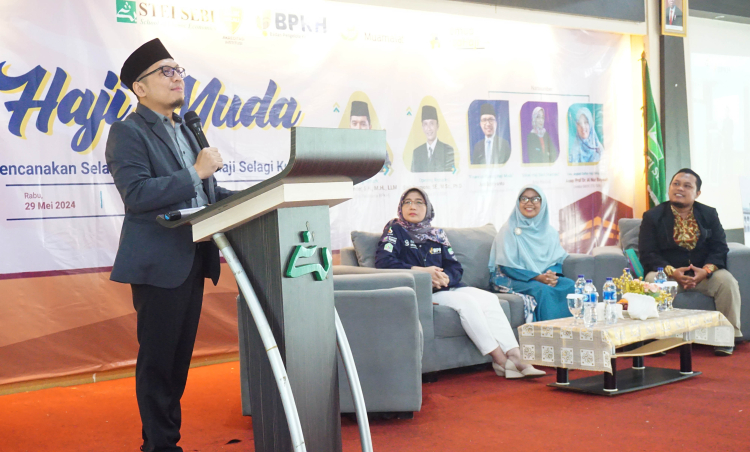STEI SEBI has once again participated in the successful young hajj campaign. This socialization program was held in collaboration with the Indonesian Hajj Financial Management Agency (BPKH) and Bank Muamalat Indonesia (BMI) on Wednesday, May 29, 2024, at the SEBI Hall, within the STEI SEBI campus. The theme of this program was "Come on Young Hajj, Realize the Intention, Plan While Young, and Perform Hajj While Strong." Previously, STEI SEBI had also organized a similar event on December 14, 2023, at the Budi Utomo Ballroom, Bumi Wiyata Hotel, Depok.
The socialization program was attended by more than 150 participants, including students, lecturers, education staff, and the general public living around the STEI SEBI environment. The program featured three speakers from BPKH, Bank Muamalat, and STEI SEBI. BPKH, represented by Juni Supriyanto as the Deputy of the Collection Division, presented materials related to young hajj financial planning. Bank Muamalat, represented by Ana Hastuti as the RCEO of the Jakarta East Bank Muamalat, presented materials related to Bank Muamalat's hajj solutions. STEI SEBI presented Ai Nur Bayinah, the Director of SIBERC, who shared tips on the five steps to register for hajj while young.
In his presentation, Juni Supriyanto explained the background of the young hajj program. The initiative aims to encourage the younger generation to plan and perform the hajj pilgrimage at a younger age, as the hajj requires adequate financial, physical, and knowledge abilities. "In my opinion, the ability to perform hajj (istitha'ah) is not only about financial and physical health, but also requires knowledge (istita'ah). Currently, 75% of Indonesian hajj pilgrims are over 40 years old. This means that with a waiting period of around 25 years, they are likely to depart at the age of 65 or older. This age condition is certainly quite challenging. By performing hajj at a younger age, we can have enough time to prepare the necessary requirements, both financially, physically, and in terms of knowledge. This must be planned while young, as almost 90% of hajj activities require physical ability," explained Juni.
To realize the young hajj plan, Juni provided tips to obtain a hajj quota while young. By replacing the daily habit of drinking modern coffee with saving for hajj, one can accumulate the necessary funds to deposit the hajj quota, which is worth 25 million rupiah, within 4 years. "Saving for hajj with a cup of coffee? Assuming the price of a cup of coffee is 20,000 rupiah, if the daily coffee expenses are saved for 4 years, it will accumulate to around 28 million rupiah. With this money, we can deposit the hajj quota at an Islamic bank," explained Juni, who is an expert in Islamic finance.
At the end of his presentation, Juni also reported on BPKH's performance and its contribution in allocating the returns from hajj fund investments and the perpetual community fund to subsidize the Regular Hajj Operation Costs (BPIH). "The average Regular Hajj Operation Costs (BPIH) for the 1445H/2024M Pilgrimage Year for each pilgrim is 93,410,286 rupiah. BPKH has provided a BPIH subsidy in the form of a benefit value of 37,364,114 rupiah, or the equivalent of 40%," explained Juni Supriyanto. [sm]
